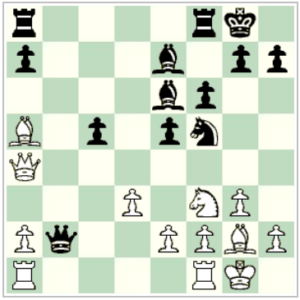A report on the 1951 Irish championship has been added to the tournament pages here.
The championship was held in University College, Cork from the 16th to the 24th July. Eighteen players participated over eight rounds with the Swiss pairing system being used.
The field included the veteran nine-time Irish titleholder John O’Hanlon and the winners of the three most recent Championships – Dónal O’Sullivan (1948), Paddy Kennedy (1949) and Vincent Maher (1950).
Austin Bourke had been in good form earlier in 1951, winning the Civil Service Championship (which had qualified him for the national championship) and then going on to secure the Leinster title. Bourke was unbeaten after five rounds in Cork, but had won only twice to leave himself a half-point behind the leaders. He then stepped on the gas in the next two rounds, beating O’Sullivan and Maher to assume the sole lead. Going into the final round only Bourke, O’Hanlon and O’Sullivan remained in contention for the Championship title. The top two pairings (with scores after round 7 in brackets) were:
A. Bourke [5.5] – J.J. O’Hanlon [5.0]
D.J. O’Sullivan [5.0] – E.N. Mulcahy [4.5]
O’Sullivan had the better of the opening against Mulcahy and, in the position below, missed an excellent chance.
15.Ng5! Now if 15…fxg5 (best) 16.Bxa8 and if 16…Rxa8 White plays 17.Qc6 forking Rook and Bishop, coming out of the combination at least the exchange up. Black should instead probably play 16…Qxe2 – although that would also concede the exchange, there might be some potential for a kingside attack.
Although 15.Nd2, the move actually played, still maintained a slight advantage for O’Sullivan, he could not subsequently cope with Mulcahy’s energetic play and the game ended in checkmate on Black’s 37th move.
Mulcahy was awarded the best game prize for this effort by James Creevey, winner of two Irish Championship matches against O’Hanlon in the 1930s.
Meanwhile, according to the Cork Examiner, after Bourke played the Réti Opening “O’Hanlon’s ingenious efforts to win failed to bear fruit against Bourke’s careful defence. The draw was sufficient to give Bourke the championship.”
Although a Waterford man, and by 1951 resident in Dublin, Bourke winning the Championship at University College Cork seems very appropriate – he had first made his name in the chess world while a student at U.C.C., earning a place in the 1935 Irish Olympiad team.
After competing his studies, he remained in Cork to be a lecturer in Mathematics, until in 1938 he joined the Irish Meteorological Service on its foundation, eventually becoming its Director. He had a distinguished career in public service and was a noted expert on potato blight and the Irish Famine.
After his 1951 victory Bourke continued to play competitive chess, but he never participated in the Irish Championship again.

